Virtual games bring pinball to new audiences
- Published
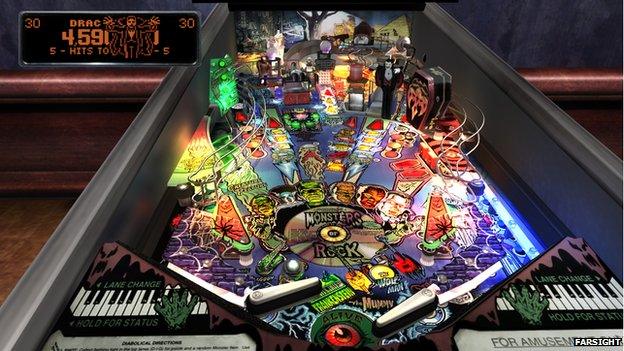
FarSight Studios has bought the licences to many pinball tables, such as Monster Bash from Williams
The flashing lights, cool sound effects and high-speed bouncing ball action have made pinball simulators a hugely popular genre of video game, not to mention big business for the software houses that develop them.
Yet it's likely that a large proportion of those who play virtual pinball titles have no idea that they are based on real, physical pinball tables that were commonplace until 15 or 20 years ago.
That's because these large, imposing, artwork-covered machines were driven out of pubs, cafes and arcades by video games, and all but one of the manufacturers - Chicago-based Stern Pinball - abandoned the trade.
But the pinball machine business is now enjoying a revival, and it's the video games industry that is helping fuel it.
One of the leading pinball video game developers is California-based FarSight Studios. Ironically it owes much of its success to two now-defunct pinball manufacturers Williams and Gottlieb.
FarSight's business model is based on buying up the licences to many of those two companies' most successful pinball tables and creating highly accurate digital simulations. These virtual classic machines can then be played on phones, tablets, games consoles and home computers.
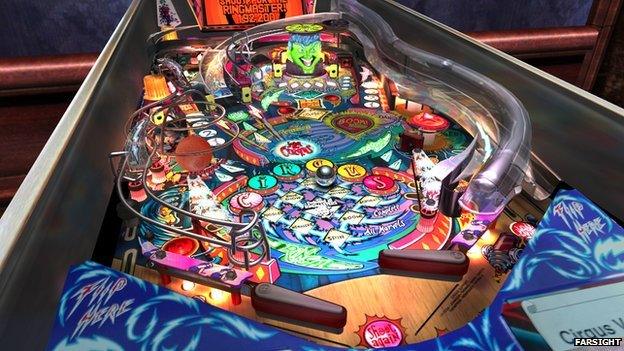
FarSight's virtual games can be played on a range of devices
The reason for creating digital replicas of real machines came down to the fact that while programming a virtual pinball game is not hard, designing games that are actually fun to play is very difficult.
It therefore made more sense to reproduce the works of successful pinball game designers from the past, believes Bobby King, FarSight's vice president of product development.
"The pinball machines produced in the 1990s and beyond were very deep and had complex rules, and I certainly didn't feel comfortable trying to design better ones," he says.
Preserving pinball culture
A side effect of this decision is that the machines that FarSight has reproduced in virtual form are now being exposed to far more people than was possible when they were only available as physical tables.
Some titles had production runs of less than 3,000 units when they were manufactured in the 1990s.
But the digital replicas have been bought and downloaded many times more than that, says Mr King.
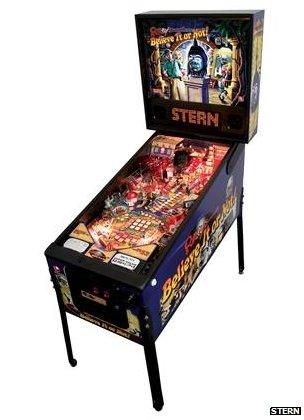
Stern Pinball still makes machines that sell for around £5,000 each
"We are introducing classic pinball tables to people who would otherwise never get an opportunity to play them, and we are also preserving these machines and their culture," he adds.
FarSight's digital tables are also used by competitors in pinball competitions - which are also growing rapidly in popularity - to practise on and familiarise themselves with the rules of individual tables that they may never have played on before.
Gary Stern, president of Stern Pinball, is happy to see pinball moving onto digital devices while his company continues to make new tables. He doesn't believe that virtual pinball tables that cost a few pounds each threaten his business that sells new machines for around £5,000 ($8,000).
The company has even allowed two of its older machines - Ripley's Believe It Or Not! and Harley-Davidson - to be reproduced by FarSight.
"Licensing a game like Ripley's can only attract more interest in the title," Mr Stern says. "I'm told that after Ripley's was released in digital form, the secondhand price of the real machines went up."
He adds that using digital replicas could become a valuable way of introducing new titles to the world and providing a taster to entice new buyers. "Designing a pinball machine is a major task, so it could be that in the future we do a video game simulation of a new machine at the same time."
'Imagine what they could do'
But there is no reason why FarSight should restrict itself to creating software replicas of other companies' pinball machines, and Bobby King says the company is planning to produce its own original designs.
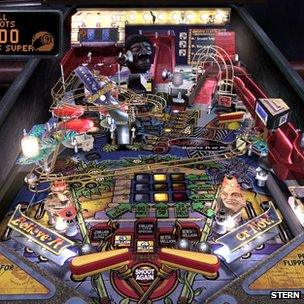
Stern believes the digital reproduction of its games helped raise the price of second-hand machines
"We have talked to some of the famous pinball designers from the past, and they are definitely interested," he says.
"Those cost considerations [of the past] are irrelevant when machines are designed only to be built in the virtual world, so imagine what these guys could do if they were given carte blanche."
He suggests that virtual pinball could become a low-cost proving ground for table designs, and successful ones could end up as real machines.
"If we made a digital table and it sold a million copies and it was feasible to build it in the real world, then I think that design would have to be of interest to a manufacturer like Stern," Mr King says.
Pinball football
That, however, is not a possibility for Zen Studios, another pinball video games development company based in Budapest, Hungary. The company specialises in designing "fantasy" pinball games with explosions and special effects that could never be recreated on a real pinball machine.
"Being from a video games background, we make games that are more interactive and include elements that young people expect," says Mel Kirk, Zen's vice president of publishing.
"They may think that pinball is boring, but our games have explosions and tables that turn upside down and that kind of thing. We see a future in creating a completely new pinball experience."
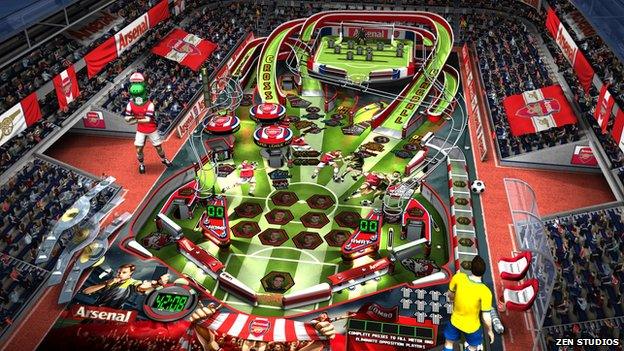
Companies like Zen Studios are trying to make pinball more interactive for young people
The company's latest pinball title, Super League Football, is a bizarre combination of pinball machine and football game. It features dancing mascots and animated football players within the virtual table. The company has acquired licences to include some of the world's top teams including Arsenal, Real Madrid, Barcelona and AC Milan.
Games like this go far beyond anything that is possible on a physical pinball machine. But no matter how many explosions or dancing mascots are added, virtual pinball will never rival the real thing for pinball purists.
That's because ultimately it is only a digital simulation of the analogue world: the ball always obeys the rules written down in programme code, and always behaves in the same way in the same situation. Contrast that with real pinball, where the balls aren't forced to obey any programmer's rules, and where no two games are ever the same.
"In pinball," concludes Gary Stern, quoting the late industry pioneer Harry Williams, "the ball is wild."